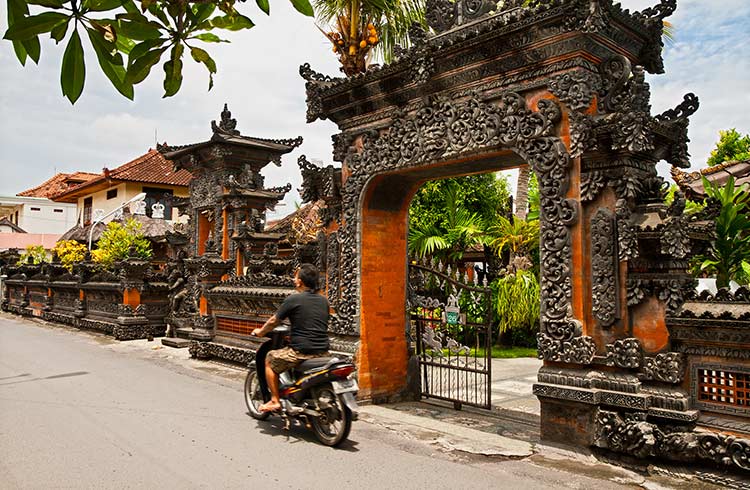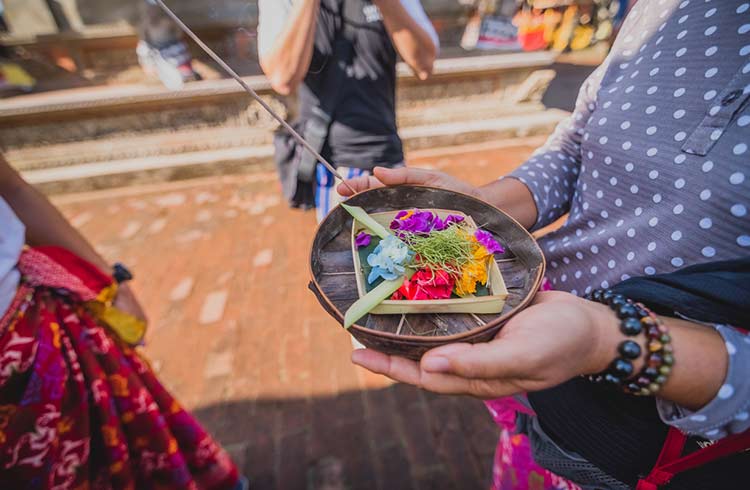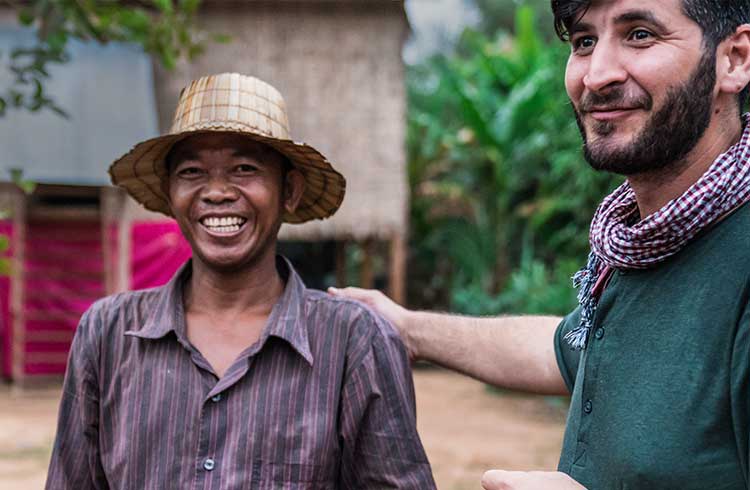How to Avoid Crime & Corruption When Visiting Indonesia
Coronavirus (COVID-19) and travel: The situation around the world is changing dramatically. Various governments have changed their travel warnings to restrict travel during this time. To understand how this may impact cover under your policy, please go to our FAQs and select your country of residence.
For the latest travel warnings and alerts around the world, read about lockdowns and border restrictions.
Watch out for pickpockets, police corruption and criminal activities. Find out how to stay safe and avoid crime while traveling in Indonesia.
Shares
 Photo © iStock/Yulia-B
Photo © iStock/Yulia-B
Among a population of 277 million people, there are sure to be a few bad eggs. But Indonesia is a surprisingly safe place to visit.
I traveled well over 9,300mi (15,000 km), through all parts of the country, researching my latest book and came across nothing worse than the odd bout of over-charging by a hired driver or becak (cycle-trishaw) rider.
Criminal elements tend to gravitate towards urban areas (Kuta, Jakarta, Yogyakarta. Makassar…) where pickings are richer. You might expect that risks increase as you journey into remoter areas but most traditional communities retain an ingrained sense of hospitality towards visitors and village law enforcement tends to be more watchful and efficient than urban police could ever be.
In a country where around 10% of the population lives below the poverty line, it would be foolish to make yourself an easy target. There are inherent risks and complications to traveling through this archipelago of around 13,000 islands, however. Here are some things to watch out for.
- Petty crime in Indonesia
- Violent crime in Indonesia
- Transportation crime in Indonesia
- Money and credit card scams in Indonesia
- Organized crime in Indonesia
- Police corruption in Indonesia
- Cohabitation as a crime in Indonesia
- Drug trafficking in Bali
- Terrorist threats in Bali
Petty crime in Indonesia
Wherever tourists gather there are likely to be pickpockets and – while bag snatches are rare – it is wise to be on the alert. It pays to keep your wits about you when unexpectedly approached by a stranger who is obviously intent on engaging you in conversation. Don’t carry more cash than you can afford to lose and remain alert for motorbike-mounted snatchers when using your phone on busy streets. Don’t keep cash or wallets in loose pockets and carry daypacks slung in front of you rather than behind in crowded places.
There have been reported incidents of pickpockets and thieves spiking the drinks of tourists in Kuta (Bali). It is unwise to accept drinks from strangers anywhere in the world and you should keep an eye on your glass.
While bootlegging branded fashion items is something that most visitors take for granted as a fact of life on Bali, bear in mind that expensive bottles of spirits are likewise not always what they appear to be. There is an inherent risk of methanol poisoning in drinking cheap cocktails with spirits (ie arak) of dubious origin.
Violent crime in Indonesia
Violent crime is so rare in Indonesia that it could almost go unmentioned. A rare exception to the almost ubiquitous peace of rural Indonesia lies in Lombok where armed robbery and even machete attacks have been reported.
There have been cases of groups of armed motorbike ‘bandits’ holding tourists up on remote roads. Worse still sometimes ropes have been tied across country lanes and tourists have been robbed after being knocked off their bikes. Remain vigilant, don’t travel during darkness and if possible ride in a convoy when in areas where such things are prevalent.
Transportation crime in Indonesia
Bag snatches are rare but it is sensible to keep car windows up in dense traffic, to lock valuables under the seat when traveling by scooter and to keep possessions close by on trains or buses.
In the past, Indonesian taxi drivers have been notorious (like their counterparts in London, Paris and New York) for over-charging new arrivals. More recently Uber-style transportation apps such as Grab and Gojek (and relatively new arrivals Air Asia and Maxim) have revolutionized the way people – foreigners and islanders alike – get around.
With these apps, you pay the same rate as a local and have the added security of traveling with a driver who has been verified. It is always useful (and polite) to speak a few phrases of the local language but these apps also negate the need for convoluted route explanations and irritating haggling bouts.
Money and credit card scams in Indonesia
You are almost certain to be converted into an instant millionaire the first time you hit an Indonesian ATM so ensure that you’re familiar with all the zeros on the banknotes. You can hardly claim that a crime has been committed if you accidentally fork out a million rupiah (AU$96) for an airport taxi that should have cost you 100,000.
With ATMs widely available there is little reason these days to run the risk of changing your money at a currency exchange. Beware of suspicious cameras or attachments on ATMs and be aware of any bystanders. Monitor your account closely and keep your bank’s emergency contact number handy so that you can cancel cards as soon as you notice a suspicious transaction.
It is wise to have a separate card – uploaded only with minimal funds – that you can use for ATM withdrawals and card purchases while abroad. Wise (previously Transferwise) is an ideal traveling card since it works well in most countries around the world and you are only charged at local rates.
Organized crime in Indonesia
Organized mafia-style crime is not something that the average visitor is likely to run foul of. As in other countries, these organizations tend to be involved in gambling, drugs and prostitution. The first two practices are strictly illegal in Indonesia with the death penalty still enforced for drugs. There are no specific laws forbidding sex work, but local and regional bylaws frequently list it among vaguely defined ‘crimes against decency/morality’.
Even apart from arrest, extortion and bribery are an inherent risk for anyone who believes that prostitution, drugs and gambling form a part of the ideal tropical holiday. In the past, some police officers have worked hand-in-hand with organized criminal syndicates to relieve foreigners of their money in this way.
Police corruption in Indonesia
While the Indonesian police force has traditionally had a terrible reputation for corruption it is fair to say that things have changed markedly in recent years. A decade ago, police roadblocks – basically shakedowns (invariably within a short walk of ATM machines) – were common occurrences on highways all over the island.
President Joko Widodo’s anti-corruption drives – even to the extent of applying the death penalty for corruptors – have become popular with Indonesians from all walks of life (apart from the obvious exceptions). While corruption still exists, it is far less common than it once was.
You will see anti-corruption signs in police stations and government buildings and the handing over of ‘on-the-spot’ fines for traffic violations – such as not wearing a crash helmet. It’s a crime to ride a motorbike without a helmet yet thousands of tourists do this in Bali every day. Bear in mind that this could bring you into contact with the police…or, worse, into contact with the road.
Cohabitation as a crime in Indonesia
In December 2022, the Indonesian Government caused an international stir when it announced that unmarried couples could face six months in prison or a fine. The backlash – involving canceled Bali holidays for unmarried international couples – helped to put things in a more balanced perspective.
It is not a law that is likely to affect foreign visitors, or even in most cases Indonesian citizens. As it stands, proceedings can only be instigated if the cohabitation is reported by parents, offspring or a spouse.
Drug trafficking in Bali
Don’t do it. Under the present anti-corruption drive apprehension by the police even for possession is far more likely to lead to arrest than to extortion or a hefty bribe. If you are fortunate, the arrest might lead to a lengthy prison sentence. If you are less fortunate, it could even lead to the death penalty. It’s worth repeating – don’t do it.
Terrorist threats in Bali
It is important to remember that Indonesians of all faiths are hospitable, friendly and welcoming people and that fanatics and militants are in the tiny minority. Terrorist organizations have been active in the past with horrifying effect, however, and Islamic State, ash-Sham (aka Jemaah Anshorut Daulah) and Jemaah Islamiyah have cadres in what is famously known as the world’s biggest Muslim country.
The United Nations Office on Drugs and Crime has stated that ‘Indonesia has made notable progress in strengthening the legal regime against terrorism, in conformity with the international treaties against terrorism.’
The vast majority of holidays to Indonesia pass without the merest unpleasant experience but if you are worried about such eventualities it is worth considering that terrorists are more likely to target busy westernized areas. In general, the threat from crime diminishes in Indonesia with each kilometer you stray from the beaten path.
Get a travel insurance quote for Indonesia
You can buy at home or while traveling, and claim online from anywhere in the world. With 150+ adventure activities covered and 24/7 emergency assistance.
Related articles
Simple and flexible travel insurance
You can buy at home or while traveling, and claim online from anywhere in the world. With 150+ adventure activities covered and 24/7 emergency assistance.
Get a quote

3 Comments
Unfortunately, African Americans may find themselves getting extra attention when they go through immigration in Indonesia. I lived and worked in Medan, North Sumatra for two years. I traveled throughout the country a great deal for work. When going through customs, I was routinely pulled out of line, searched and asked what I was doing there.
I've taken buses and bemos all over Bali, Lombok, Flores and Sulawesi without knowing much Indonesian other than basic greetings and numbers and have never had any issues. You definitely don't need functional Indonesian to take the bus, although it's always a good idea to try to learn at least a few phrases.
Thanks for sharing these useful tips Phil! If I may add from my research (http://travelscams.org/asia/common-tourist-scams-indonesia/), do be wary of these other common scams such as the rigged money exchange, batik scam and temple touts! Hope this helps!